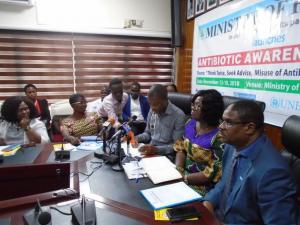Antibiotic resistance fight is a shared responsibility, says Minister of Health
Mr Kwaku Agyeman-Manu, the Minister of Health, has said everyone, including health workers, must get involved in the antibiotic resistance campaign and urged the public to be cautious when patronizing antibiotics and to seek advice from health professionals for appropriate action.
He said antibiotic resistance had come about due to many complicated factors and needed to be tackled holistically.
The Minister said this in a speech read on his behalf at the launch of this year’s World Antibiotics Awareness Week (WAAW) on the theme: “Think Twice. Seek Advice,” in Accra.
It was organised jointly by the Ministry and the Pharmaceutical Society of Ghana (PSGH) in collaboration with the World Health Organisation (WHO), Organisation of Food and Agriculture, World Organisation for Animal Health (OIE) and Hope For Future Generation, a Civil Society Organisation.
World Anitbiotic Awareness Week (WAAW ) is celebrated every year in November to increase global awareness of antibiotics resistance and to encourage best practices among the public, health workers and policy makers to avoid the further emergence and spread of antibiotic resistance.
Mr Agyeman-Manu said the major cause of resistance had been attributed to irresponsible use including incorrect medical indications, inappropriate self-medication, non-adherence to therapy, over-the-counter sale of antibiotics from unlicensed pharmacies and unapproved outlets and inappropriate use in animals across all sectors.
“When antibiotics are obtained and used inappropriately, selective pressure is brought to bear, favouring the emergence of resistance strains. Without urgent action, we are heading for a post-antibiotic era, where common infectious diseases will pose a challenge to treatment,” he added.
“For Ghana, this phenomenon could have dire consequences on the poor and vulnerable as well as the affluent. Thus, effort at controlling and containing resistance have been designed from a broad perspective as well as within the framework of regional and global networking and information sharing.”
These, interventions, the Minister said, had been duly put into policy and a comprehensive action plan with monitoring and evaluation framework also developed.
Dr Owen Kaluwa, the WHO Country Representative to Ghana, said this year, the Organisation had introduced sub-themes to showcase the immense work underway to tackle antimicrobial resistance, which demonstrated “how antibiotics are linked to humans, animals and the environment”.
“Nothing less than global health security is at stake when antibiotics are misused, from being miracle life-savers, antibiotics are becoming ineffective against resistant infections, which can affect anyone of any age, in any country at any time,” he said.
“Antibiotic resistance occurs when bacteria (not in humans or animals) become resistant to the active ingredients in these medicines. These resistant bacteria may infect humans and animals, making infections like pneumonia, tuberculosis and gonorrhoea harder to treat.”
“Africa lacks data on the scope and scale of antibiotic resistance. However, we know that antibiotic resistance is rising because common bacteria, which cause urinary tract infections, diarrhoea and septic wounds, among others, are becoming resistant to readily available and prescribed antibiotics.”
Dr Kaluwa, therefore, suggested investments to build a smarter world for safe and effective medicines, saying; “Research and development is the cornerstone of new, life-saving antibiotics.”
He called on governments, funding agencies and the private sector to invest and work together to secure safe, effective medicines for generations to come.
Dr Bashiru Boi Kikimoto, the Head of Public Health of Veterinary Services, said it was estimated that over 70 per cent of all antimicrobials in use globally were in the animal sector, with only 30 per cent used in humans.
That, he said, was a big challenge to the veterinary profession, hence, the more reason why OIE had tasked all countries through the veterinary medical focal persons to gather data on antimicrobials in use in various countries.
Dr Kofi Afatse, the FAO Representative, said antibiotic resistance was becoming a public concern and called for measures to counter the menace at all levels through intensive public awareness creation.
Ms Yvonne Esseku, the Vice President of Pharmaceutical Society of Ghana (PSGH), called on all stakeholders to do their part to preserve “the antibiotics that we have”.
That, she said, should be done through acquiring antibiotics from qualified health professionals and to complete the full course as prescribed even when one felt better after a few days of treatment.
She also advised the public to discuss issues about antibiotics with pharmacists, obtain them with prescriptions, share information about their abuse and misuse with others and avoid sharing them with friends even if they seemed to have the same symptoms.



